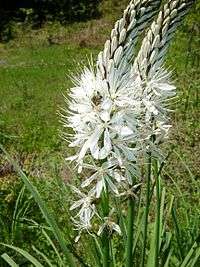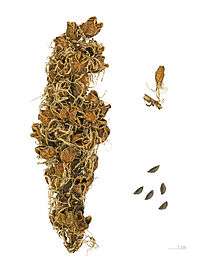Asphodelus albus
| Asphodelus albus | |
|---|---|
| | |
| Scientific classification | |
| Kingdom: | Plantae |
| Clade: | Angiosperms |
| Clade: | Monocots |
| Order: | Asparagales |
| Family: | Asphodelaceae |
| Subfamily: | Asphodeloideae |
| Genus: | Asphodelus |
| Species: | A. albus |
| Binomial name | |
| Asphodelus albus Willd. | |
| Synonyms | |
| |
Asphodelus albus, common name white asphodel, is a herbaceous perennial plant belonging to the genus Asphodelus.
Description


White asphodel grows to a height of 50–120 centimetres (20–47 in). The plain stem is supported by fleshy, thickened roots (rhizomes). The leaves, which originate from the base of the stem, are gutter-shaped and glaucous (covered by a waxy coating), about 20–22 millimetres (0.79–0.87 in) wide and 50–70 centimetres (20–28 in) long. The white hermaphroditic flowers are funnel-shaped, 4 centimetres (1.6 in) of diameter, with six elongated petals. The flowering period extends from April through June. The egg-shaped yellow-green seed capsules are usually 8–10 millimetres (0.31–0.39 in) in length.
Distribution
This plant is native to the Mediterranean area.
Habitat
White asphodel is commonly found in meadows and heathland of central Spain, southwest France, and along the southern Alps to the western Balkans up to an altitude of 2,000 metres (6,600 ft). It is also found on the continent Africa, mainly in Libyan territory. Soils with a high lime content are preferred.
In culture
In Ancient Greece, white asphodel was associated with mourning and death. Its presence was held to facilitate the transition of the dead to Elysium, and it is a feature of the Asphodel Meadows.
Subspecies
- Asphodelus albus subsp. villarsii (Verl. ex Billot) I. Richardson & Smythies
- Asphodelus albus subsp. carpetanus
- Asphodelus albus subsp. delphinensis
- Asphodelus albus subsp. occidentalis
References
- Pignatti S. - Flora d'Italia - Edagricole – 1982 Vol. III, pag. 346
- Plants profile
- Asphodelus albus
- Encyclopædia Britannica